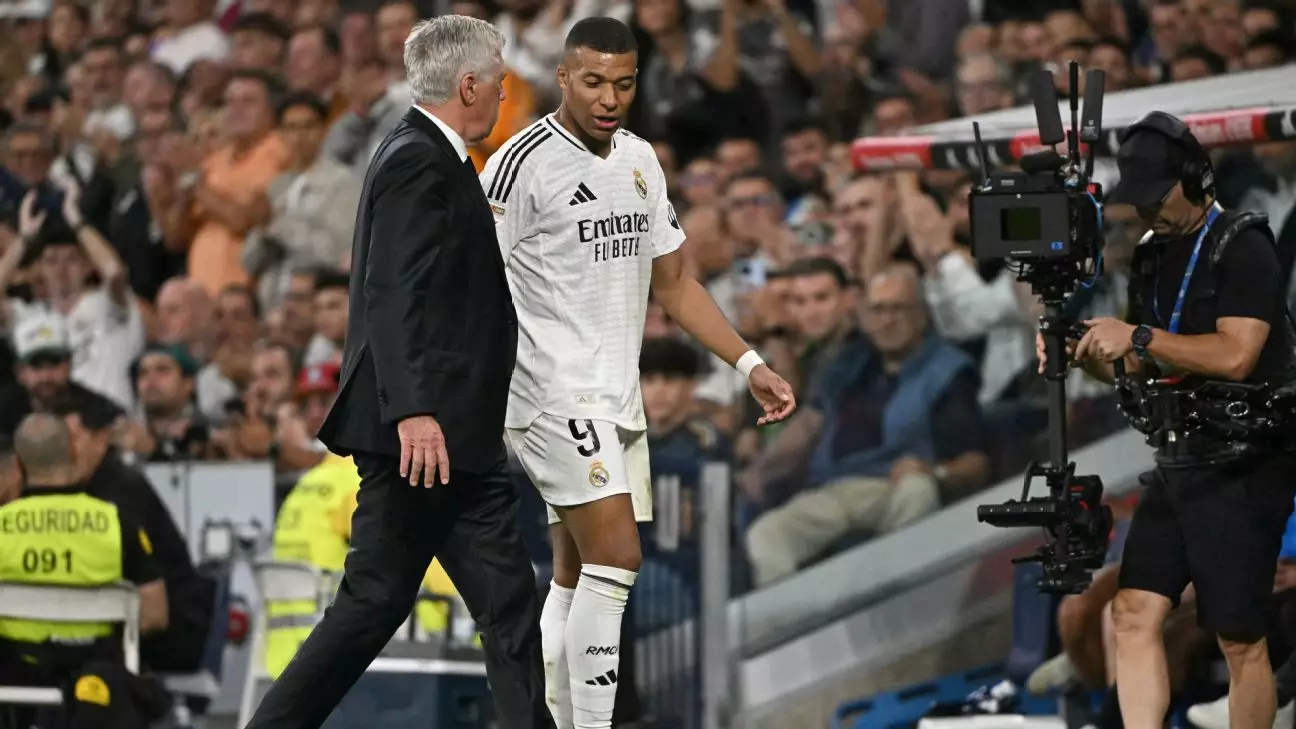In the world of football, few players garner as much attention and excitement as Kylian Mbappé. Recently, the young Frenchman made headlines not only for his skills on the pitch but also for his recovery from a thigh injury that had sidelined him for a brief period. As confirmed by Real Madrid’s manager Carlo Ancelotti, Mbappé might make his return against Lille in an important Champions League match. This article will delve into the implications of his return, the concerns surrounding player health in elite sports, and the broader context of football culture as it relates to fan behavior.
Mbappé’s injury occurred during a critical LaLiga match against Alavés, where he performed admirably until the unfortunate strain. Initially, it was rumored that he would be out for approximately three weeks, which would have had significant repercussions for Real Madrid during this pivotal stage of the season. However, Ancelotti reported a surprisingly swift recovery, stating that Mbappé had trained independently and was keen to return to the field. It is essential to recognize the advanced medical technologies and training methodologies that may have facilitated this quick turnaround. Nonetheless, the decision to play him will ultimately hinge on a careful assessment of his fitness.
While Ancelotti expressed optimism, this swift recovery from a grade one strain raises questions about athlete welfare in high-stakes environments. Professional athletes are often driven to push through pain and return to the game more quickly than ever advisable. This scenario begs a moral consideration regarding the responsibility that teams, coaches, and even players themselves bear regarding health versus performance.
The Consequences of Expectations
The intense pressure placed on players to perform can sometimes cloud judgment, both from within the athlete and the organization. For too long, the narrative in professional sports has revolved around resilience and the “play through the pain” mentality. Mbappé’s case serves as a specific example within a broader systemic issue. With public and media pressure mounting, the desire to return when perhaps one should not can exacerbate injuries or lead to long-term health consequences.
Critically analyzing this situation, one must wonder: at what point do the expectations jeopardize the long-term viability of the player? Is it worth risking a player with such immense potential and talent for the sake of a few crucial games? The dialogue around these sports culture dynamics remains ongoing, and Mbappé’s situation serves as a crucial touchpoint.
A Broader Context of Football Ethics
While discussions of player welfare and injury return timelines are crucial, they must also be understood in the context of fan behavior and sportsmanship. The recent events surrounding the Madrid derby highlighted a disturbing trend within the sport. The match was marred by incidents of violence from fans, which ultimately detracted from the essence of the game. Ancelotti and midfielder Aurélien Tchouaméni were vocal in denouncing the fans’ unacceptable behavior, emphasizing that the sport should be an enjoyable and safe environment.
In light of this, the criticism levied against players, like Thibaut Courtois for his emotional response during highly charged moments, seems misplaced. Ancelotti’s response to several violent acts during the derby reinforced the necessity of separating on-field emotions from crowd behavior. Conflating the two only distracts from tackling the real issue: inadequate management of fan conduct in stadiums.
As Mbappé prepares to rejoin his teammates on the pitch, fans and analysts alike are eager to witness how his presence will impact Real Madrid’s performance in upcoming matches, particularly against Lille in the Champions League. He has already netted seven goals this season, showcasing his significant contribution to the squad’s dynamics. However, more important than his scoring prowess will be his ability to return at full fitness without risking his future in the sport.
Kylian Mbappé’s injury and the anticipation of his return encapsulate not only the complexities of professional sports but also the broader implications on both player welfare and fan culture. As fans celebrate the prospect of seeing one of football’s brightest stars return, it is critical to maintain a perspective that prioritizes the long-term health of the game and its players above short-term results. Understanding this balance will determine the future of not just Mbappé’s career, but also the integrity and culture of football as a whole.

Leave a Reply